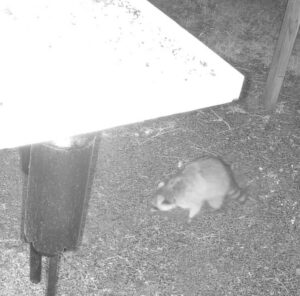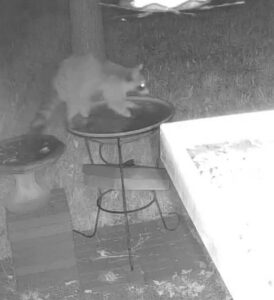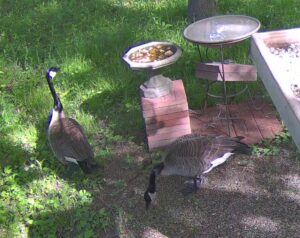The Canada Geese in our yard ……
Those of you who have been watching the birdcam since the beginning of March have probably witnessed what Cleon and I call The Annual Great Goose War. We have lived here almost 20 years and each year, we have a nest out on our point. Most times the nest is successful and the parents will bring the young to our feeders. Each spring from late February through mid April, Canada Geese fight over who is going to nest on this point and this year was no exception. We can have as many as 6-8 geese in our back yard all honking and hissing at each other, chasing each other, and pulling out each other’s tail feathers. If you witnessed one of these skirmishes and had your sound turned up, I am sure you will agree – the din is deafening! It is truly amazing how loud fighting geese actually are!
One pair became dominant and once they started winning the battles, they worked together to keep all other geese out of our yard and away from the feeders. Our yard then became their territory and they defended it very well.
The female started her nest. She does this be settling down on the ground and wiggling around. She then turns round and round – churning up the ground with her big feet, then settles and wriggles around some more. Once she has a depression that satisfies her, she nestles in it and reaches out with that long neck to grab plants, leaves, and twigs to mound around her body. She then adds lots of fine dried grass and bits of plants plus down from her own tummy. She did complete her nest and laid 3 eggs and then her nest was destroyed. All 3 eggs taken from the nest and broken.


We think it was a raccoon. There are at least 3 living in our neighborhood and probably more. Raccoons are predators of eggs and even a large goose’s nest is vulnerable. This could have happened at night as raccoons are active at night as you can see from these 2 photos which were taken by our birdcam about 3 hours after sunset, or it could have happened late in the afternoon.
In our experience here on our small lake, a nesting pair of Canada Geese will leave the nest, and the immediate area, from 30 minutes to an hour before sunset and both birds will be out of sight of the nest for at least 20 minutes. The female does cover the eggs with dried grass, but the nest is vulnerable at that time. When I was birding close to sunset at Brigantine Wildlife Refuge in New Jersey, I was watching shorebirds foraging in the wet sand. Up on the bank was a Canada Goose nest and I had watched both geese fly away. All of a sudden, out of nowhere, an American Crow swooped down onto those covered eggs, took one it its talons, and flew away. It was all over before I could blink an eye! So the nest on our point could have been plundered during that unattended time or it could have happened at night. Except for that unattended time late afternoon, the female sits tight and the male patrols just offshore in the lake so both birds should have been right there to defend.
It is my experience that most Canada Geese do not try a second nest. it is once and done. However your experience with these birds may be different and if it is, please use the Public Forum to tell us what you have observed. Our nesting pair is still in our backyard and as you can see, still foraging under our feeders – I took this photograph a few minutes ago. And they are still defending this territory from other geese so it might be they will try to renest.
 Some birds – like Canada Geese – are monogamous and mate for life. These pair bonds are strong. But one thing that can break the bond is an unsuccessful nest – especially if there are several years in a row of unsuccessful nesting. And an unsuccessful nest could be the result of nest predation – as occurred here in our yard – or infertile eggs. The pair in our yard seems to have a strong bond. They are always within sight of each other and forage together several times a day. But will the bond hold through this year and into next nesting season? I don’t know, but I wish them well!
Some birds – like Canada Geese – are monogamous and mate for life. These pair bonds are strong. But one thing that can break the bond is an unsuccessful nest – especially if there are several years in a row of unsuccessful nesting. And an unsuccessful nest could be the result of nest predation – as occurred here in our yard – or infertile eggs. The pair in our yard seems to have a strong bond. They are always within sight of each other and forage together several times a day. But will the bond hold through this year and into next nesting season? I don’t know, but I wish them well!
As to the impact on our small lake, these birds having an unsuccessful nest is probably for the best. Our lake is only 16 acres and we have resident Canada Geese. We can have anywhere from about a dozen to over 100. Three years ago we had a very successful nesting season on the lake and I counted at least 45 babies. This is way too many geese for this habitat. So unsuccessful nests are probably better right now for the balance of our lake and surrounding habitat. But that said, I am still sad for these two birds who lost their nest and eggs.

